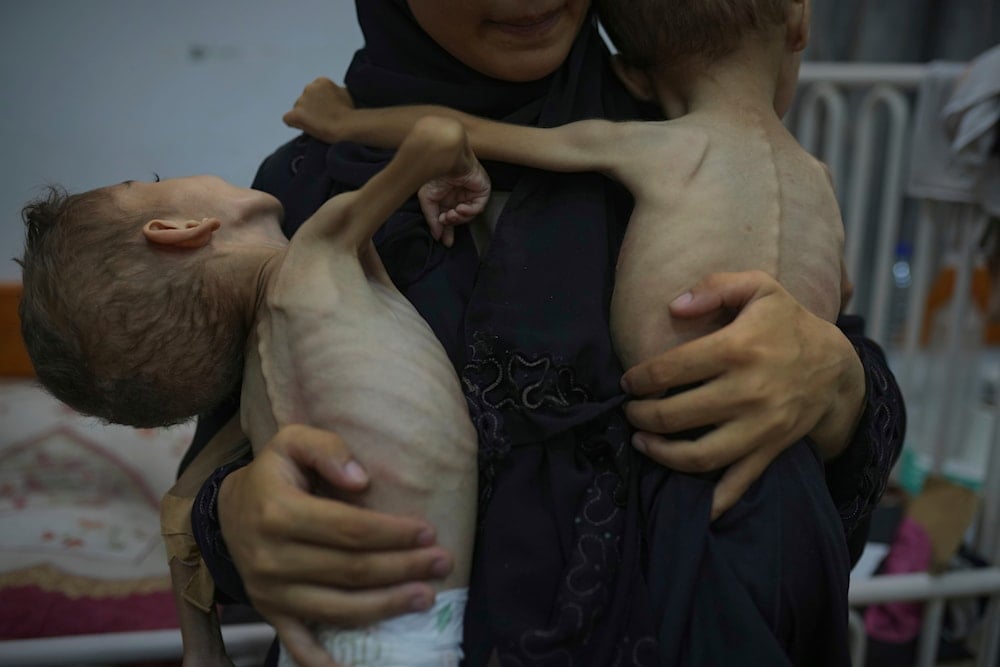Parents helpless as famine strips Gaza’s children to skin and bone
With famine declared, Gaza’s families face an unbearable truth: no food, no help, and no way to stop their children from slowly starving to death.
-

Omniya Mahra holds shirtless for a photo her sons, Oday, 4, left, and Mohammed, 3, who suffer from malnutrition and a genetic nerve disorder, at the Friends of the Patient Hospital in Gaza City, Tuesday, July 29, 2025 (AP)
For Gaza’s 2.2 million residents, the UN-backed confirmation that famine is now a reality came not as a revelation but as a cruel validation of what they have lived for months: a slow, visible collapse into starvation.
“All my children have lost nearly half of their body weight,” Jamil Mughari, 38, from Maghazi in central Gaza, told The Guardian. “My daughter, who is five years old, now weighs only 11kg. My son Mohammad has become just skin and bones. All my children are like this.”
Once 85kg himself, Mughari said he had dropped to 55kg and now struggles just to walk.
“Sometimes, while walking in the street, I feel dizzy and that I’m about to collapse, but I force myself to stay upright. I also sometimes experience shivering.”
In the past week alone, Gaza crossed two devastating thresholds. The official Palestinian death toll surpassed 60,000, though the true number, especially those buried under rubble from Israeli strikes, is higher. And on Tuesday, the Integrated Food Security Phase Classification (IPC) formally declared that the “worst-case scenario of famine” is unfolding in Gaza.
“The worst-case scenario of famine is currently playing out in the Gaza Strip,” the IPC warned, urging an immediate ceasefire to prevent more “catastrophic human suffering.”
Under the Israeli occupation, Gaza has long been familiar with hunger
Even before the latest escalation, Gaza residents had endured chronic food shortages, compounded by "Israel’s" severe limitations on aid deliveries. Now, with infrastructure decimated and access to food nearly impossible, desperation is universal.
“We can go for a week or two without any flour,” said Mughari. “Sometimes we only have one meal a day, which is lentils, and sometimes we find nothing at all to eat – we spend the day drinking water just to feel full."
His family has been forcibly displaced seven times since the war began. Hunger, unlike the bombs, offered no safe zone to flee to.
“Sometimes we get lentils from donations or charitable people, or we borrow some money to buy them, that’s it,” he said. “We don’t receive any food aid from soup kitchens; those are only for certain camps, in small quantities.”
Across the Strip, distribution centers operated by the Gaza Humanitarian Foundation open only briefly. In many cases, Israeli fire has targeted starving Palestinians, causing harrowing massacres.
'We are dying slowly'
Mansoura Fadl al-Helou, a 58-year-old widow, no longer attempts to obtain aid. Frail and fearful, she forbids her son from risking the trip to distribution points.
“Only my one son is here, but I always stop him from going near the aid trucks because of the danger posed by the army. I couldn’t bear to see him come back to me as a martyr,” al-Helou told The Guardian.
Mughari, who recently underwent open-heart surgery, said none of his children, all under 12, could possibly withstand the risks involved in chasing food.
“We have sent many messages to the world, but no one has moved. We no longer know what to say. All I can tell the world is that we are dying slowly, save us from this tragedy.”
Parents witnessing their children starve
Among the most harrowing aspects of the Israeli genocide in Gaza is the powerlessness of parents watching their children wither from hunger.
“My youngest daughter is 14 years old, and her ribcage bones are clearly visible due to extreme weakness and malnutrition,” said Abu al-Abed, a father from Deir al-Balah.
“I have four daughters and three sons. They suffer from dizziness and fatigue because of the lack of food. If I, their father, feel this way, how much worse must it be for them?”
He said his family receives no assistance, and prices in the markets are impossibly inflated.
“The prices are extremely high; they haven’t reached such levels of inflation even in European countries. And here in Gaza, there is no source of income at all.”
With soup kitchens shuttered and aid mechanisms collapsing, survival has become a matter of chance.
“There used to be soup kitchens in the area, but now they no longer exist. There are no places that provide free food anymore.”
‘They lied to us about human rights’
Disillusionment with the international community runs deep. “For years, they boasted about human rights and the protection of lives. What I see now is that all of this was a lie, we were deceived by these slogans,” Abu al-Abed said.
“If we had asked them to protect the rights of animals in Gaza, they would have responded immediately and done the impossible. But when it comes to the rights of the Palestinian people, no one remembers us or feels for us, not the Arabs, not the Muslims, not the Christians, no one.”
“We have been suffering from this famine for a long time, and no one has acted,” said al-Helou. “I hope that through this message, the world will finally move to help us and save us from this slow death.”

 5 Min Read
5 Min Read










